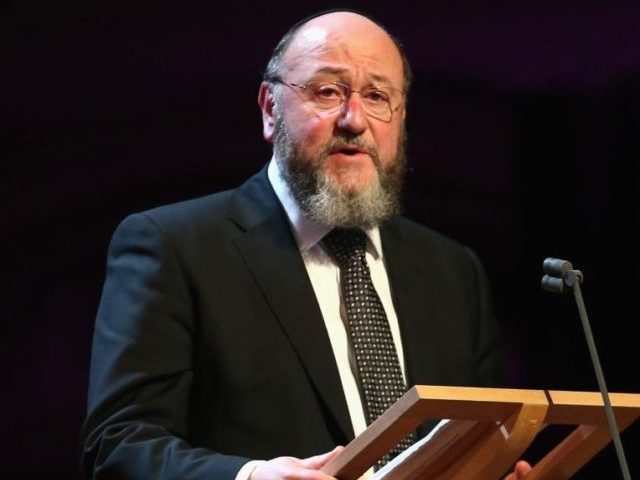Senior Labour figures have been accused of spreading the “insidious virus of anti-Semitism” by Britain’s Chief Rabbi, Ephraim Mirvis.
Calling on the Labour Leader Jeremy Corbyn to take “decisive action,” Rabbi Mirvis further criticised those within the party who have suggested that allegations of widespread anti-Semitism are mere political attacks designed to oust Corbyn as leader.
The suspension of Bradford West MP Naz Shah last week sparked a bitter battle between warring factions of the Labour Party. Some sought to pin the blame for Labours decent into the politics of anti-Semitism on leader Jeremy Corbyn, while others flatly denied that there is an anti-Semitism problem in the party and claimed that any suggestions to that effect were evidence merely of the lengths that Mr Corbyn’s enemies would go to to discredit him.
Yesterday, a Labour councillor suspended by the party for anti-Semitic comments posted to social media in 2014 sought to blame Islamophobia for his suspension, telling the BBC that he was only suspended because he was a Muslim, and that there was a “witch-hunt going on”.
But Rabbi Mirvis has denounced those who have downplayed allegations of anti-Semtism, accusing them of making light of the issue with their politicking. Writing for the Telegraph, he said: In recent days, we have heard anti-Semitism in the Labour Party described variously as “a smear” and as “mood music” being manipulated by political opponents of Jeremy Corbyn.
“There has been nothing more disheartening in this story than the suggestion that this is more about politics than about substance. The worst of mistakes, in trying to address this problem, would be to treat it as a political attack which requires a political solution.”
Commenting upon the Labour Party’s recently commissioned inquiry into anti-Semitism within its ranks, he added: “If this inquiry turns out to be no more than a sticking plaster, designed to placate and diffuse until after the elections this week, the problem will surely get worse and not better.”
Among Britain’s Jewish population there has been a sense of relief that the issue of latent anti-Semitism, masquerading as anti-Zionism, is being aired in public debate. But the row has also made it painfully clear to some Jews that there is a gross misunderstanding of Zionism as a colonialist creed, when for many it merely represents the Jewish right to self-determination.
Speaking to the BBC on the issue last week, the author Howard Jacobson described Zionism as “a liberation movement”.
He added: “I wasn’t brought up as a Zionist, but I was brought up to believe: whatever you think about Israel, don’t forget that you might need it one day. There are very few Jews living that won’t feel that somewhere or other, they might need it one day.
“And when you hear people talking about Israel in the way that they’re talking about it now, one might indeed feel one needs it again to flee to, because where else?”
This sentiment was echoed by Rabbi Mirvis, who called out the left on its hypocrisy in granting every group the right to self-determination – except Jews: “It is astonishing to see figures on the hard Left of the British political spectrum presuming to define the relationship between Judaism and Zionism despite themselves being neither Jews nor Zionists. The likes of Ken Livingstone and Malia Boattia claim that Zionism is separate from Judaism as a faith; that it is purely political; that it is expansionist, colonialist and imperialist,” he wrote.
“It is unclear why these people feel qualified to provide such an analysis of one of the axioms of Jewish belief. But let me be very clear. Their claims are a fiction. They are a wilful distortion of a noble and integral part of Judaism. Zionism is a belief in the right to Jewish self-determination in a land that has been at the centre of the Jewish world for more than 3,000 years. One can no more separate it from Judaism than separate the City of London from Great Britain.
“Throughout our collective history we have yearned for a chance to determine our own future, to revive an ancient language and return to rejoice in our love for this tiny sliver of land. Zionism is a movement celebrated by people right across the political spectrum, all over the world, and requires no endorsement or otherwise of the particular policies of any Israeli Government at any time.
“But to those people who have nevertheless sought to redefine Zionism, who vilify and delegitimize it, I say: Be under no illusions – you are deeply insulting not only the Jewish community but countless others who instinctively reject the politics of distortion and demonisation.
“To those who so eagerly reach for a vicious Holocaust reference in order to exact the maximum amount of pain and offence upon “Zionists”, I say: You are spreading that ancient and insidious virus of anti-Semitism.”
Naz Shah was quick to apologise for her anti-Semitic social media posts which last week came to light. Speaking in the commons she denounced them as anti-Semitism and determined to build bridges with the Jewish community.
But other senior Labour figures have not been so contrite. Former London Mayor Ken Livingstone is still vowing to fight his suspension, while Hackney MP Diane Abbott appeared on the BBC at the weekend denying that there was any anti-Semitism problem in Labour.
And their leader, Jeremy Corbyn, today refused to withdraw comments in which he called Hamas and Hezbollah “friends”. When challenged on the issue by Prime Minister David Cameron during Prime Minister’s Questions, Corbyn replied “I’ve made it very clear Labour is an anti-racist party and there is no place for anti-Semitism within it.”

COMMENTS
Please let us know if you're having issues with commenting.